CURRICULUM
Original Curriculum

By developing our own individual curriculum, we can make sure that the content is designed specifically to suit the needs and interests of our students.
Our dedicated curriculum team has created our own original phonics program, complete with original characters to help children with their first steps towards literacy. We also have a detailed Sight Words program. These complementary programs help us maintain the confidence that our students will graduate with stronger literacy skills than other students within the same age group.
In addition to our excellent original Numeracy program, we also run month-long integrated curriculum programs. This curriculum allows children to learn in a hands-on way, through practical experiments, creative arts, music and literature.
Numeracy
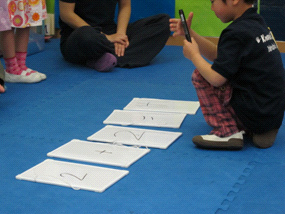
Our Numeracy Curriculum uses a lot of concepts and teaching techniques from Singapore Math.
We teach content including numbers, calculations, measurement (including reading the time and calendars), patterns, sorting, chance and data, and spatial sense.
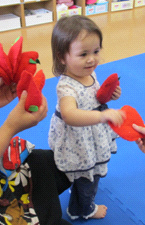
We have a structured Numeracy curriculum, but we also understand that learning arises constantly from events and happenings, play and routines that occur naturally within the early childhood learning environment.
We encourage teachers to take their lead from the children and their interests and to use the opportunities that arise in the context of their play to strengthen children's mathematical understandings.
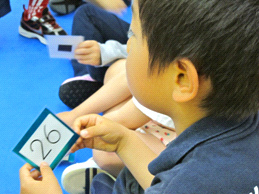
We also recognize the importance of following up on children's responses to provoke mathematical thinking. For example asking children to describe and explain their thinking helps them to clarify their own ideas and gives us insight into their current understandings.
Numeracy work is always supplemented by visual aids, and by using concrete materials.We understand the importance of giving children a solid foundation in math, so we make sure each concept is clear and enjoyable by including a lot of games and activities to aid in the learning process.
Literacy
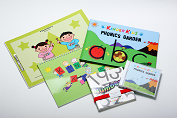
Providing a literacy rich environment for children in their early years will create the foundation for the children's future reading and writing ability.

We take care to stock our schools with high quality picture books-both fiction and non-fiction. We provide a lending library of level readers for our older classes, and make sure that story time is part of our daily routine.
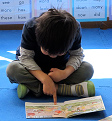
Our Literacy program has been developed by Kinder Kids professional teaching staff.
We believe that by introducing components of reading and writing through games and songs, that children can develop skills and confidence at an early age.
Our program is based on two key components, synthetic phonics and sight words.
Phonics
We have an original phonics system, with cute, easy-to-remember characters for each phonetic sound making it easier for children to remember the sounds. This means that even very young children can learn the building blocks of phonics. From our Junior Kinder year, children begin reading level readers and find instant success due to their strong phonics base. This builds confidence and ensures enjoyment in the reading process.
Children also experience early success in spelling, with our structured introduction to sounds and words. This helps when they come to produce their own pieces of writing, as they are soon able to write easily decodable spellings and communicate through their writing.
Sight Words
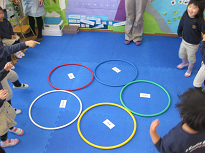
A sight word is a word that frequently occurs in literature and cannot necessarily be decoded using phonics skills alone. At Kinder Kids, we choose to teach children a set of words to read from memory. This increases their reading efficiency, and therefore their confidence.
Our Kinder Kids Sight Words list was compiled after a careful study of two existing lists: The Dolch List (which catalogues the most commonly occurring words in children's literature) and the Fry List (which referenced all branches of English literature). This research was then combined with our years of teaching experience to assemble the Kinder List. In our list, certain words have been coupled together, e.g. 'these' and 'those', 'when' and 'if' to help children to compare and contrast the spelling and meaning of these words.

In addition to the phonics and sight words elements, we also have a Handwriting program for practicing letter formation, which begins as early as Toddler, with manipulation of play dough, followed by tracing of lines and shapes, and continued through the older grades with focused writing practice.
Children learn to apply these phonics, sight word, handwriting and sentence building skills by writing sentences in their journals. We are very proud of the level that the children can achieve, and of their enjoyment of the writing process.
Theme

Our theme curriculum is designed to expose children to a wide range of concepts and vocabulary. They are designed to feature many social studies and science based content. We start from the familiar, and over their years at Kinder Kids we build upon previous knowledge to increase the children’s knowledge and understandings.
The main goals of our theme curriculum are:
■To learn through teacher-led play and real experiences
■To expose children to a wide range of concepts and vocabulary
■To make predictions and hypothesise, to research and experiment
We learn using books, songs, art & craft, cooking, science, exploration and imaginative play.
Below is an example of the way our theme curriculum progresses over the years at Kinder Kids:
Junior & Senior ToddlerVocabulary sun Key concepts: I can see the sun in the sky during the day. I can see the moon in the sky at nighttime. |
PreschoolVocabulary spaceship Key concepts: We live on a planet called Earth. People called astronauts ride in spaceships and go into space. |
Junior KinderVocabulary Mercury Key concepts: We live on a planet called Earth. There are 7 other planets. Some of the planets have one or more moons. Earth has one moon. |
Senior KinderVocabulary orbit Key concepts: The solar system is very big. I know the names of all 8 planets. I know that it takes the Earth one year to travel around the sun. That means that between my birthdays I travel around the sun once! |
Social & Life Skills
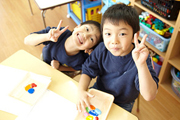
Social Skills are any skills that facilitate interaction and communication with others. Life skills relate to those skills that are necessary for a child to be able to deal with the challenges in everyday life.
At Kinder Kids we believe in developing social skills in the following five main areas
■Demonstrates co-operative behavior
■Solves problems
■Respects others
■Demonstrates good manners
■Understands self
We also believe in developing life skills in the following four main areas
■Dresses independently
■Eats well and uses table manners
■Responsible for own belongings
■Awareness of others
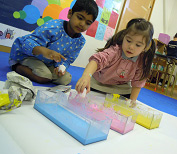
In the teaching of both sets of skills we use encouragement and positive reinforcement to help guide the children. Both social skills and life skills are an integral part of the educational experience so we take opportunities to refine these skills in real situations as they are presented, and also give the children a range of opportunities to apply their skills.
Fine Motor Skills

Fine Motor Skills are the skills required to provide strength and control for the muscles in our hands.

We have provided a wide range of fun activities to help children to further refine these skills.
As they practice Fine Motor Skills, children are learning to squeeze, rip, pinch and manipulate various materials and will eventually use these skills to become more adept at life skills such as dressing, undressing, eating with utensils, and using tools such as crayons, paintbrushes, scissors, and pencils.

We also recognize the importance of following up on children's responses to provoke mathematical thinking. For example asking children to describe and explain their thinking helps them to clarify their own ideas and gives us insight into their current understandings.
Numeracy work is always supplemented by visual aids, and by using concrete materials.We understand the importance of giving children a solid foundation in math, so we make sure each concept is clear and enjoyable by Including a lot of games and activities to aid in the learning process.
Gross Motor Skills
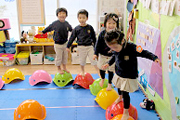
Gross Motor Skills are the skills required to move the large muscles of our bodies. This is the first step in muscle development and coordination for young children.
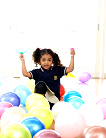
As they practice Gross Motor Skills through a variety of activities, they are gaining skills such as balance, spatial awareness, laterality (the difference between left and right), and awareness of their body's position and its movement capabilities.
